人教版(2019)必修第一册 Welcome unit 重点单词短语讲练课件(36张ppt)
文档属性
| 名称 | 人教版(2019)必修第一册 Welcome unit 重点单词短语讲练课件(36张ppt) |  | |
| 格式 | pptx | ||
| 文件大小 | 514.7KB | ||
| 资源类型 | 教案 | ||
| 版本资源 | 人教版(2019) | ||
| 科目 | 英语 | ||
| 更新时间 | 2022-09-25 13:39:46 | ||
图片预览

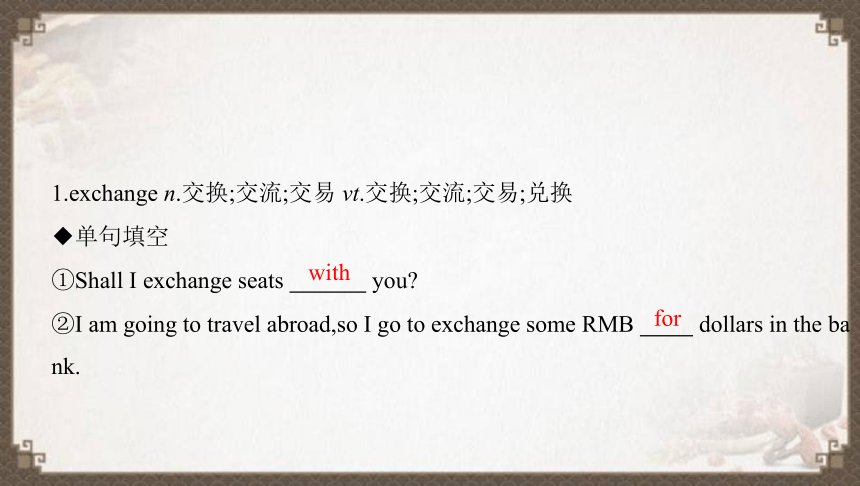
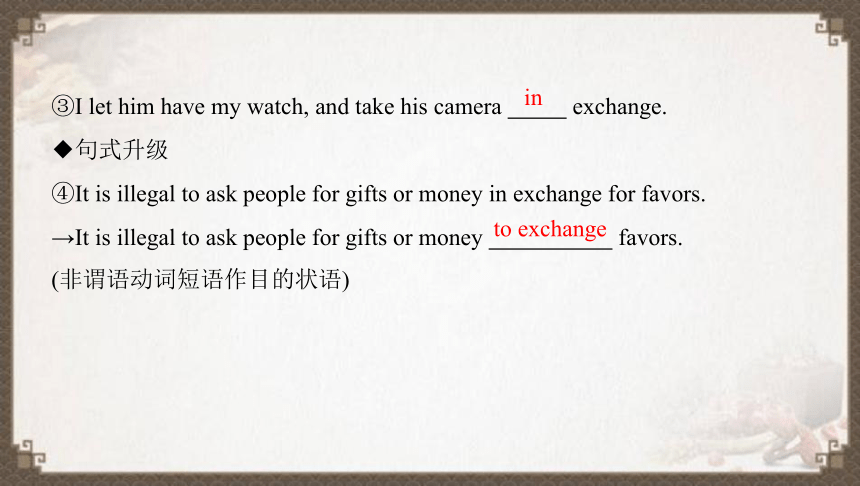
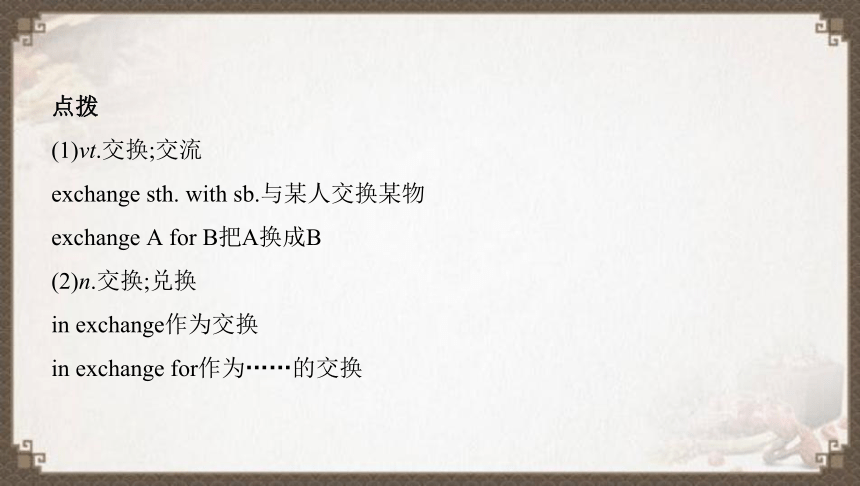
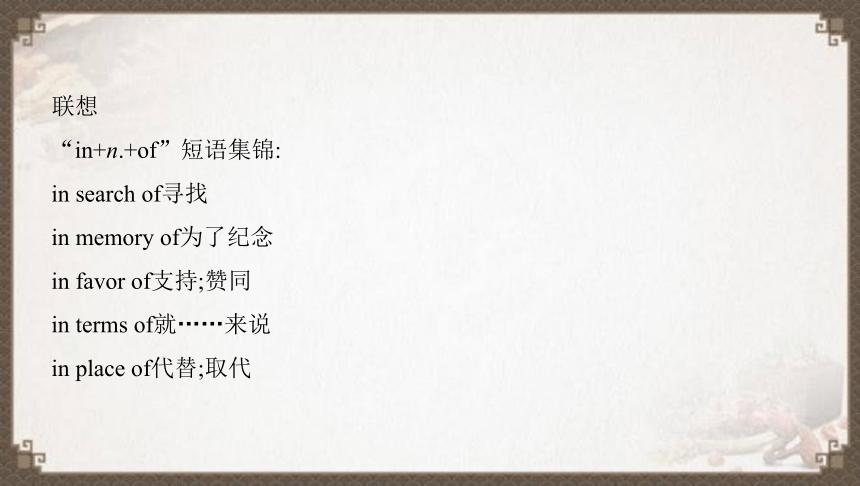
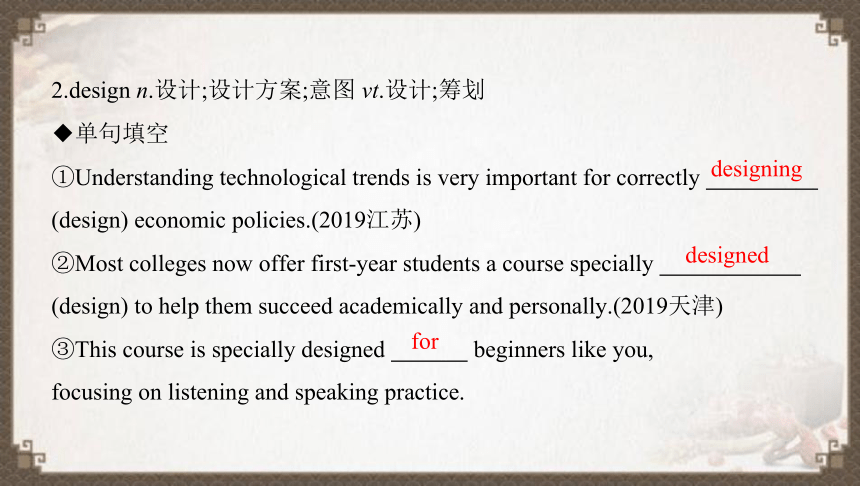
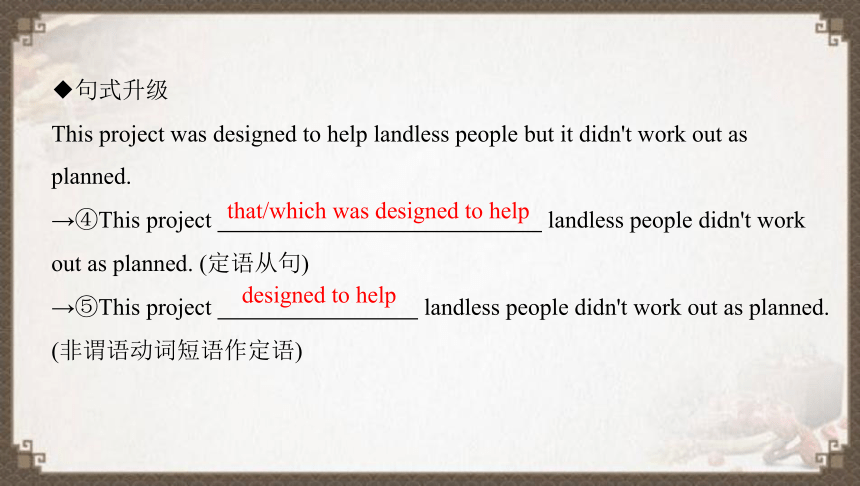
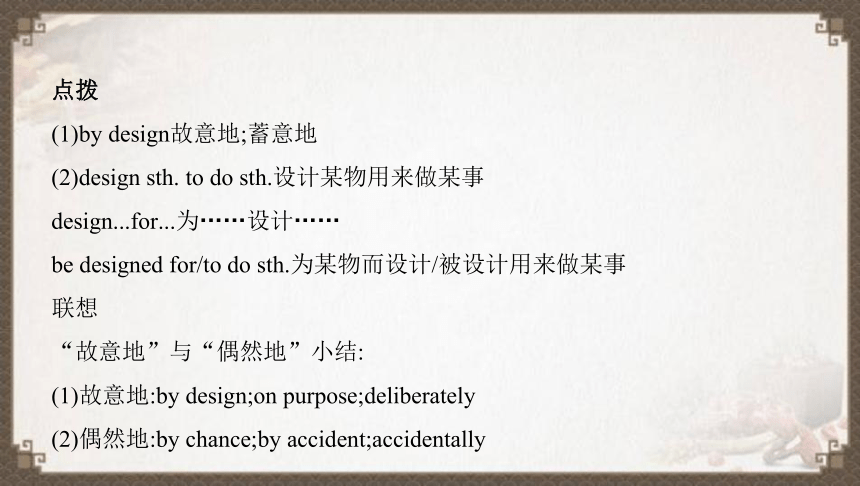
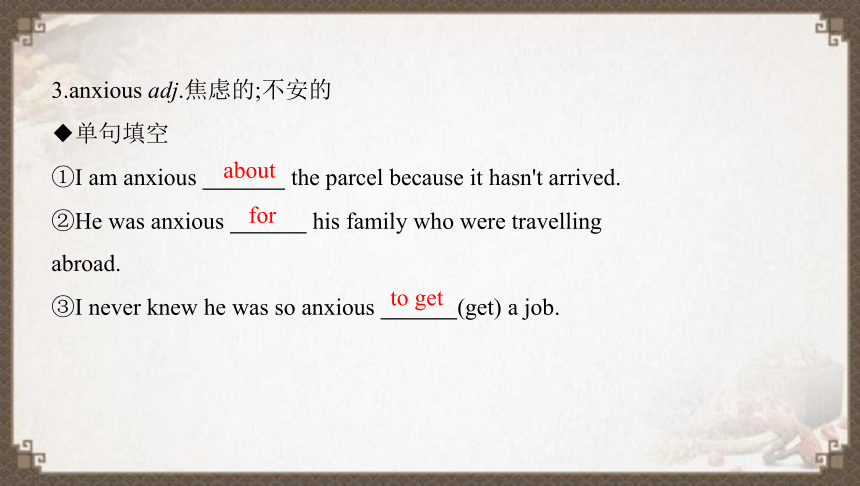
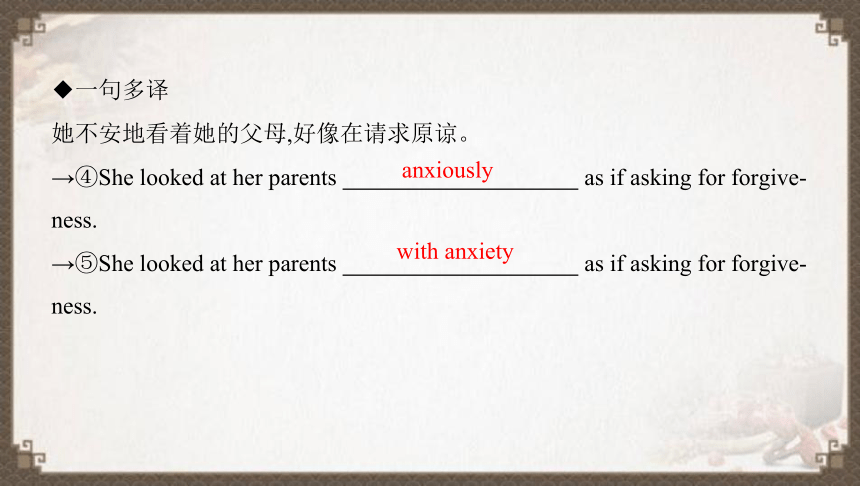
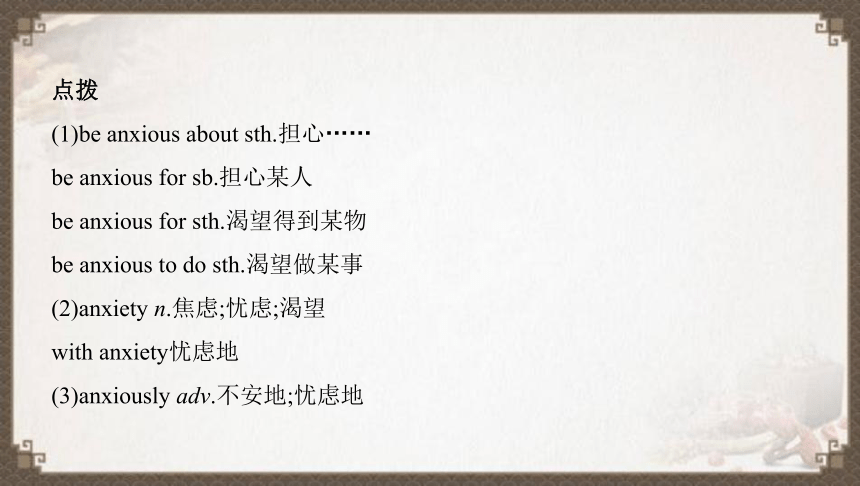
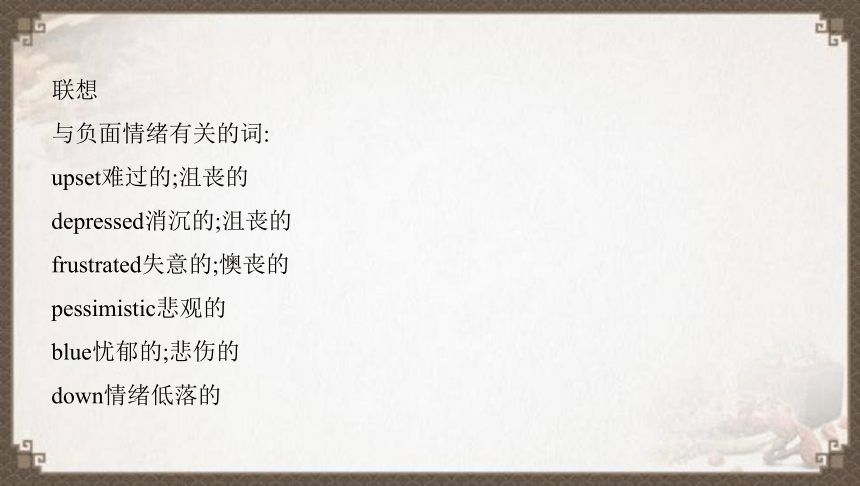
文档简介
(共36张PPT)
WELCOME UNIT
重点单词短语讲练
1.exchange n.交换;交流;交易 vt.交换;交流;交易;兑换
◆单句填空
①Shall I exchange seats you
②I am going to travel abroad,so I go to exchange some RMB dollars in the bank.
with
for
③I let him have my watch, and take his camera exchange.
◆句式升级
④It is illegal to ask people for gifts or money in exchange for favors.
→It is illegal to ask people for gifts or money favors.
(非谓语动词短语作目的状语)
in
to exchange
点拨
(1)vt.交换;交流
exchange sth. with sb.与某人交换某物
exchange A for B把A换成B
(2)n.交换;兑换
in exchange作为交换
in exchange for作为……的交换
联想
“in+n.+of”短语集锦:
in search of寻找
in memory of为了纪念
in favor of支持;赞同
in terms of就……来说
in place of代替;取代
2.design n.设计;设计方案;意图 vt.设计;筹划
◆单句填空
①Understanding technological trends is very important for correctly
(design) economic policies.(2019江苏)
②Most colleges now offer first-year students a course specially
(design) to help them succeed academically and personally.(2019天津)
③This course is specially designed beginners like you,
focusing on listening and speaking practice.
designing
designed
for
◆句式升级
This project was designed to help landless people but it didn't work out as
planned.
→④This project landless people didn't work
out as planned. (定语从句)
→⑤This project landless people didn't work out as planned.
(非谓语动词短语作定语)
that/which was designed to help
designed to help
点拨
(1)by design故意地;蓄意地
(2)design sth. to do sth.设计某物用来做某事
design...for...为……设计……
be designed for/to do sth.为某物而设计/被设计用来做某事
联想
“故意地”与“偶然地”小结:
(1)故意地:by design;on purpose;deliberately
(2)偶然地:by chance;by accident;accidentally
3.anxious adj.焦虑的;不安的
◆单句填空
①I am anxious the parcel because it hasn't arrived.
②He was anxious his family who were travelling
abroad.
③I never knew he was so anxious (get) a job.
about
for
to get
◆一句多译
她不安地看着她的父母,好像在请求原谅。
→④She looked at her parents as if asking for forgive-
ness.
→⑤She looked at her parents as if asking for forgive-
ness.
anxiously
with anxiety
点拨
(1)be anxious about sth.担心……
be anxious for sb.担心某人
be anxious for sth.渴望得到某物
be anxious to do sth.渴望做某事
(2)anxiety n.焦虑;忧虑;渴望
with anxiety忧虑地
(3)anxiously adv.不安地;忧虑地
联想
与负面情绪有关的词:
upset难过的;沮丧的
depressed消沉的;沮丧的
frustrated失意的;懊丧的
pessimistic悲观的
blue忧郁的;悲伤的
down情绪低落的
4.annoyed adj.恼怒的;生气的
◆单句填空
①I hope she won't get annoyed my careless mistakes.
②Bess was annoyed (find) that coffee was not ready.
③I was annoyed my younger brother.
④Don't openly express (annoy) at a professor or class.(2019课标全国Ⅲ)
at/about
to find
with
annoyance
◆句式升级
⑤Try making a note of the annoying things.
→Try making a note of the things .(定语从句)
that/which annoy you
点拨
(1)annoy vt.使恼怒;使烦恼;使生气
(2)annoyed adj.恼怒的;生气的;烦恼的
be annoyed with sb.对某人生气
be annoyed about/at sth.为某事生气
be annoyed to do sth.因做某事而生气
(3)annoying adj.令人生气的
(4)annoyance n.恼怒;烦恼
联想
常见的-ed形容词:
interested感兴趣的
surprised感到好奇的
satisfied感到满意的
amazed感到惊讶的
excited感到激动的
5.frightened adj.惊吓的;害怕的
◆单句填空
①I'm not sure who is (frighten),me or the female gorilla
(大猩猩) that suddenly appears out of nowhere.(2018课标全国Ⅲ)
②She is frightened the dark and needs to be accompanied.
③She was frightened (look) down from the top of a tall
building.
more frightened
of
to look
◆用frighten的适当形式填空
After seeing the④ film, the ⑤
boy was too ⑥ to walk home alone in the dark.
frightening
frightened
frightened
点拨
(1)frighten v.(使)惊吓;(使)惊恐
frighten sb. into doing sth.把某人吓得做某事
(2)frightened adj.惊吓的;害怕的
be frightened of sth./to do sth./that...害怕某物/做某事/……
(3)frightening adj.令人恐惧的;可怕的
易混
frightening意为“令人惊恐的,恐怖的”,常用来说明事物的特征。frightened
意为“恐惧的,害怕的,受惊的”,常用来说明人的特征。两者都可用作表语
或定语。
1.concentrate on 集中精力于
◆单句填空
①Playing computer games can give us some relaxation after school, but as stu-
dents we must concentrate our studies.
②We must concentrate our efforts on (improve) education.
③Speaking on the phone requires (concentrate).
on
improving
concentration
◆一句多译
你若集中精力学习英语,你就会掌握这门语言的。(concentrate)
→④If you English, you will master the
language.
→⑤ English, and you will master the language.
→⑥ English will enable you to master the
language.
concentrate your mind/attention/on
Concentrate your mind/attention/on
Concentrating your mind/attention/on
点拨
(1)concentrate on (doing) sth.专心于(做)某事
concentrate one's mind/attention on集中注意力于;致力于;专心于
(2)concentration n.集中;专心
联想
带on的动词短语还有:
call on号召;拜访
carry on继续进行,开展
depend on依靠
go on继续
hold on稍等片刻
insist on坚持
look on旁观
turn on打开
2.leave...alone 不打扰;不惊动
◆单句填空
①When copying this paper,be careful not to leave any word.
②You shouldn't leave the boy , for he is too young.
③Leave the boy , and he can make up his own mind.
④We'll leave Madrid by the next plane.
out
behind
alone
for
点拨
leave aside搁置一边
leave for动身去……
leave behind丢下;永远离开;落后
leave out省略;不包括;冷落
联想
leave out中的out为副词,接代词作宾语时,应把代词置于leave与out之间。
1.What if...如果……将会怎么样
教材原句
What if no one talks to me
◆单句填空
①What they talked a long time about a painting you weren't that interested in (2019天津)
② if it rains tomorrow
if
What
◆完成句子
③要是我们把沙发挪到这边来会怎么样 那样看上去会不会好一些
over here Would that look better
④假如我生病不能工作的话怎么办
and not be able to work
What if we moved the sofa
What if I should fall sick
点拨
1.表示假设
(用于询问不希望看到的事发生时的结果) “如果……怎么办,要是……将会
怎么样”,其后可用陈述语气(用一般现在时),也可用虚拟语气(用一般过去时
或should+动词原形)。
2.表示邀请或建议
What if...表示邀请或建议时,意思是“如果……怎么样 ”“如果……如
何 ”。
联想
what常用句型一览:
What about...……怎么样 (放在句首的简略问句,用来征求意见或询问情况)
What if...倘若……将会怎样
What of...……那又怎样呢 ……又有什么关系呢
What for...为何目的 为什么
What has become of sth. (遭遇)某事如何 某事(结果)怎么样
So what 那又怎么样 (认为某事无关紧要,尤用于反驳他人的指责)
2.find+宾语+宾补
教材原句
I found most of my classmates and teachers friendly and helpful.
◆单句填空
①Dick found himself (walk) in the direction of Mike's place.
②I found myself (surround) by a group of children full
of curiosity.
③Some students find it difficult (learn) English grammar.
walking
surrounded
to learn
◆句式升级
④He found that his daughter was surrounded by letters and books and she was
looking very worried.
→He found his daughter letters and books and
.(过去分词和现在分词作宾补)
surrounded by
looking
very worried
点拨
(1)find+宾语+
(2)find it+形容词+to do(it是形式宾语,to do是真正的宾语)
3.either...or...或者……或者……
教材原句
If I'm not in class, I'm either in the library or in the computer lab.
◆单句填空
①Either he or I (be) to go to the laboratory.
② (be) either you or I going there tomorrow
am
Are
◆句式升级
③In my opinion, my friends aren't as positive as Tom. Nor are my classmates.
→In my opinion, as positive as Tom.
(neither...nor...)
neither my friends nor my classmates are
点拨
either...or...要么……要么……,不是……就是……,或者……或者……,常用来
连接两个平行结构。若连接两个主语时,其谓语动词应与最近的一个主语在
人称和数上保持一致,即“就近原则”。
联想
有类似用法的还有:
neither...nor...既不……也不……
not...but...不是……而是……
not only...but also...不但……而且……
WELCOME UNIT
重点单词短语讲练
1.exchange n.交换;交流;交易 vt.交换;交流;交易;兑换
◆单句填空
①Shall I exchange seats you
②I am going to travel abroad,so I go to exchange some RMB dollars in the bank.
with
for
③I let him have my watch, and take his camera exchange.
◆句式升级
④It is illegal to ask people for gifts or money in exchange for favors.
→It is illegal to ask people for gifts or money favors.
(非谓语动词短语作目的状语)
in
to exchange
点拨
(1)vt.交换;交流
exchange sth. with sb.与某人交换某物
exchange A for B把A换成B
(2)n.交换;兑换
in exchange作为交换
in exchange for作为……的交换
联想
“in+n.+of”短语集锦:
in search of寻找
in memory of为了纪念
in favor of支持;赞同
in terms of就……来说
in place of代替;取代
2.design n.设计;设计方案;意图 vt.设计;筹划
◆单句填空
①Understanding technological trends is very important for correctly
(design) economic policies.(2019江苏)
②Most colleges now offer first-year students a course specially
(design) to help them succeed academically and personally.(2019天津)
③This course is specially designed beginners like you,
focusing on listening and speaking practice.
designing
designed
for
◆句式升级
This project was designed to help landless people but it didn't work out as
planned.
→④This project landless people didn't work
out as planned. (定语从句)
→⑤This project landless people didn't work out as planned.
(非谓语动词短语作定语)
that/which was designed to help
designed to help
点拨
(1)by design故意地;蓄意地
(2)design sth. to do sth.设计某物用来做某事
design...for...为……设计……
be designed for/to do sth.为某物而设计/被设计用来做某事
联想
“故意地”与“偶然地”小结:
(1)故意地:by design;on purpose;deliberately
(2)偶然地:by chance;by accident;accidentally
3.anxious adj.焦虑的;不安的
◆单句填空
①I am anxious the parcel because it hasn't arrived.
②He was anxious his family who were travelling
abroad.
③I never knew he was so anxious (get) a job.
about
for
to get
◆一句多译
她不安地看着她的父母,好像在请求原谅。
→④She looked at her parents as if asking for forgive-
ness.
→⑤She looked at her parents as if asking for forgive-
ness.
anxiously
with anxiety
点拨
(1)be anxious about sth.担心……
be anxious for sb.担心某人
be anxious for sth.渴望得到某物
be anxious to do sth.渴望做某事
(2)anxiety n.焦虑;忧虑;渴望
with anxiety忧虑地
(3)anxiously adv.不安地;忧虑地
联想
与负面情绪有关的词:
upset难过的;沮丧的
depressed消沉的;沮丧的
frustrated失意的;懊丧的
pessimistic悲观的
blue忧郁的;悲伤的
down情绪低落的
4.annoyed adj.恼怒的;生气的
◆单句填空
①I hope she won't get annoyed my careless mistakes.
②Bess was annoyed (find) that coffee was not ready.
③I was annoyed my younger brother.
④Don't openly express (annoy) at a professor or class.(2019课标全国Ⅲ)
at/about
to find
with
annoyance
◆句式升级
⑤Try making a note of the annoying things.
→Try making a note of the things .(定语从句)
that/which annoy you
点拨
(1)annoy vt.使恼怒;使烦恼;使生气
(2)annoyed adj.恼怒的;生气的;烦恼的
be annoyed with sb.对某人生气
be annoyed about/at sth.为某事生气
be annoyed to do sth.因做某事而生气
(3)annoying adj.令人生气的
(4)annoyance n.恼怒;烦恼
联想
常见的-ed形容词:
interested感兴趣的
surprised感到好奇的
satisfied感到满意的
amazed感到惊讶的
excited感到激动的
5.frightened adj.惊吓的;害怕的
◆单句填空
①I'm not sure who is (frighten),me or the female gorilla
(大猩猩) that suddenly appears out of nowhere.(2018课标全国Ⅲ)
②She is frightened the dark and needs to be accompanied.
③She was frightened (look) down from the top of a tall
building.
more frightened
of
to look
◆用frighten的适当形式填空
After seeing the④ film, the ⑤
boy was too ⑥ to walk home alone in the dark.
frightening
frightened
frightened
点拨
(1)frighten v.(使)惊吓;(使)惊恐
frighten sb. into doing sth.把某人吓得做某事
(2)frightened adj.惊吓的;害怕的
be frightened of sth./to do sth./that...害怕某物/做某事/……
(3)frightening adj.令人恐惧的;可怕的
易混
frightening意为“令人惊恐的,恐怖的”,常用来说明事物的特征。frightened
意为“恐惧的,害怕的,受惊的”,常用来说明人的特征。两者都可用作表语
或定语。
1.concentrate on 集中精力于
◆单句填空
①Playing computer games can give us some relaxation after school, but as stu-
dents we must concentrate our studies.
②We must concentrate our efforts on (improve) education.
③Speaking on the phone requires (concentrate).
on
improving
concentration
◆一句多译
你若集中精力学习英语,你就会掌握这门语言的。(concentrate)
→④If you English, you will master the
language.
→⑤ English, and you will master the language.
→⑥ English will enable you to master the
language.
concentrate your mind/attention/on
Concentrate your mind/attention/on
Concentrating your mind/attention/on
点拨
(1)concentrate on (doing) sth.专心于(做)某事
concentrate one's mind/attention on集中注意力于;致力于;专心于
(2)concentration n.集中;专心
联想
带on的动词短语还有:
call on号召;拜访
carry on继续进行,开展
depend on依靠
go on继续
hold on稍等片刻
insist on坚持
look on旁观
turn on打开
2.leave...alone 不打扰;不惊动
◆单句填空
①When copying this paper,be careful not to leave any word.
②You shouldn't leave the boy , for he is too young.
③Leave the boy , and he can make up his own mind.
④We'll leave Madrid by the next plane.
out
behind
alone
for
点拨
leave aside搁置一边
leave for动身去……
leave behind丢下;永远离开;落后
leave out省略;不包括;冷落
联想
leave out中的out为副词,接代词作宾语时,应把代词置于leave与out之间。
1.What if...如果……将会怎么样
教材原句
What if no one talks to me
◆单句填空
①What they talked a long time about a painting you weren't that interested in (2019天津)
② if it rains tomorrow
if
What
◆完成句子
③要是我们把沙发挪到这边来会怎么样 那样看上去会不会好一些
over here Would that look better
④假如我生病不能工作的话怎么办
and not be able to work
What if we moved the sofa
What if I should fall sick
点拨
1.表示假设
(用于询问不希望看到的事发生时的结果) “如果……怎么办,要是……将会
怎么样”,其后可用陈述语气(用一般现在时),也可用虚拟语气(用一般过去时
或should+动词原形)。
2.表示邀请或建议
What if...表示邀请或建议时,意思是“如果……怎么样 ”“如果……如
何 ”。
联想
what常用句型一览:
What about...……怎么样 (放在句首的简略问句,用来征求意见或询问情况)
What if...倘若……将会怎样
What of...……那又怎样呢 ……又有什么关系呢
What for...为何目的 为什么
What has become of sth. (遭遇)某事如何 某事(结果)怎么样
So what 那又怎么样 (认为某事无关紧要,尤用于反驳他人的指责)
2.find+宾语+宾补
教材原句
I found most of my classmates and teachers friendly and helpful.
◆单句填空
①Dick found himself (walk) in the direction of Mike's place.
②I found myself (surround) by a group of children full
of curiosity.
③Some students find it difficult (learn) English grammar.
walking
surrounded
to learn
◆句式升级
④He found that his daughter was surrounded by letters and books and she was
looking very worried.
→He found his daughter letters and books and
.(过去分词和现在分词作宾补)
surrounded by
looking
very worried
点拨
(1)find+宾语+
(2)find it+形容词+to do(it是形式宾语,to do是真正的宾语)
3.either...or...或者……或者……
教材原句
If I'm not in class, I'm either in the library or in the computer lab.
◆单句填空
①Either he or I (be) to go to the laboratory.
② (be) either you or I going there tomorrow
am
Are
◆句式升级
③In my opinion, my friends aren't as positive as Tom. Nor are my classmates.
→In my opinion, as positive as Tom.
(neither...nor...)
neither my friends nor my classmates are
点拨
either...or...要么……要么……,不是……就是……,或者……或者……,常用来
连接两个平行结构。若连接两个主语时,其谓语动词应与最近的一个主语在
人称和数上保持一致,即“就近原则”。
联想
有类似用法的还有:
neither...nor...既不……也不……
not...but...不是……而是……
not only...but also...不但……而且……
